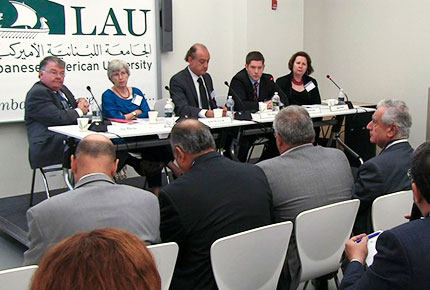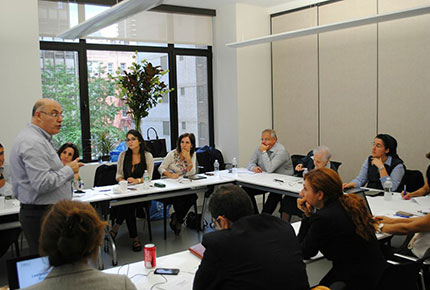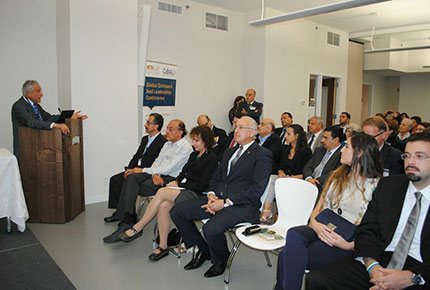NY conference gives a taste of things to come
LAU’s Outreach and Civic Engagement unit hosts international conference and workshops at the New York Headquarters and Academic Center

The panels tackled timely issues such as online learning, study abroad and strategic thinking, civic engagement and international diplomacy and last but not least civic advocacy and non-governmental organizations.

Following the conference, OCE led several workshops on civic engagement for Lebanese school and civil society leaders.
LAU’s New York Headquarters and Academic Center has gotten off to a busy start with a series of events on outreach, education and leadership.
For the building’s inaugural event, an international Global Outreach and Leadership (GOAL) conference was held on September 13-14, bringing together over 100 top policy and education professionals.
LAU’s New York Center was being unveiled at a “very challenging time for education worldwide,” said keynote speaker Dr. Judith Eaton, president of the Council for Higher Education Accreditation.
She said the field of higher education faces enormous pressures that could potentially change the academic landscape forever. To stay relevant, universities will need to reconsider their use of technological innovation, review quality assurance methods, and strengthen commitments to academic freedom. At a time when the ongoing recession is pushing more students toward low-cost online courses or degree programs, traditional universities should also think of ways to enhance universal access and student mobility, Eaton said.
On September 14, the first panel brought together four speakers to discuss online learning, study abroad programs, and strategic thinking. University priorities on research means that professors have little personal motivation to invest in their student’s intellectual development beyond the lecture hall, said Dr. Sam Potolicchio in a talk on how to foster new understandings of leadership. “Academics are rewarded almost solely on research. If the incentive shifted, we might have different results.”
A second panel tackled youth civic engagement and international diplomacy. Half of the world’s population is under 25 years old, with 1.2 billion of those being aged 15-25, noted Ahmad ElHendawi, UN Secretary-General Ban Ki-Moon’s Envoy on Youth. He urged world bodies to mainstream youth issues, particularly youth unemployment, as a matter of “urgency.” Partnerships between students and international organizations have demonstrated the benefits of listening to young people, said Mima Stojanovic, Innovation Unit research coordinator at the United Nations Children’s Fund. She highlighted the fund’s recent partnership with students from New York University, which resulted in a student-designed mobile phone application that is assisting family tracing and reunification efforts in South Sudan and Uganda.
A third panel focused on civic advocacy and international non-governmental organizations, where speakers deliberated over the growing ability of civil society to influence policy makers. The day culminated with OCE bestowing Associate of the LAU Headquarters and Academic Center status to 20 international organizations and universities. “Together, we will turn the facility into a beehive of activity,” said Elie Samia, OCE executive director.
From September 15-18, OCE led several workshops on civic engagement for 11 Lebanese school and civil society leaders seeking leadership certification. Participants visited the United Nations headquarters, the Federal Reserve Bank and a number of New York-based community service organizations.
More
Latest Stories
- Student Pharmacists: Serving Through Uncertainty
- Research Highlight: Dr. Elie Bouri on Cryptocurrency
- The Threat of Gram-Negative Bacteremia on Public Health in Lebanon
- A Frontline Like No Other: Students Take Action
- Fostering Healthy Connections in Times of Conflict
- The Crucial Role of Anesthesiologists in Mass Casualty Response
- Another Groundbreaking Discovery by the LAU Genetics Team
- LAU Faculty Recognized Regionally for Teaching Innovation


